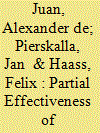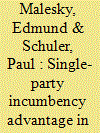| Srl | Item |
| 1 |
ID:
181196


|
|
|
|
|
| Summary/Abstract |
Dictators depend on a committed bureaucracy to implement their policy preferences. But how do they induce loyalty and effort within their civil service? The authors study indoctrination through forced military service as a cost-effective strategy for achieving this goal. Conscription allows the regime to expose recruits, including future civil servants, to intense “political training” in a controlled environment, which should improve system engagement. To test this hypothesis, the authors analyze archival data on over 370,000 cadres from the former German Democratic Republic. Exploiting the introduction of mandatory service in the GDR in 1962 for causal identification, they find a positive effect of conscription on bureaucrats’ system engagement. Additional analyses indicate that this effect likely did not result from deep norm internalization. Findings are more compatible with the idea that political training familiarized recruits with elite preferences, allowing them to behave strategically in accordance with the rules of the game.
|
|
|
|
|
|
|
|
|
|
|
|
|
|
|
|
| 2 |
ID:
171198


|
|
|
|
|
| Summary/Abstract |
Why do voters in single-party regimes express support for the ruling party in such large numbers? Scholars offer three sets of explanations: 1) Support is manipulated by regime leaders or falsified by frightened voters; 2) Support is due to genuine popularity or “performance legitimacy”; 3) The incumbent party holds an extreme incumbency advantage due to voters’ certainty about their candidates’ policy positions or access to state resources. Despite the impressive theoretical development in this literature, these arguments have not been subjected to a research design capable of examining the relative importance of each of these factors. We use a unique survey experiment on nearly 42,000 Vietnamese citizens over three years that reduces the threat of preference falsification and allows us to isolate voter's true preferences as much as possible. While we find some evidence for all three explanations, we find substantial support for incumbency bias. An important subset of Vietnamese voters—those inclined to vote for non-party candidates—sincerely favor the party under conditions of uncertainty about the candidates’ policy stances or experience in the legislature.
|
|
|
|
|
|
|
|
|
|
|
|
|
|
|
|
| 3 |
ID:
191048


|
|
|
|
|
| Summary/Abstract |
Researchers have commonly treated misrepresentations in survey responses as an impediment to the accurate measurement of a variable or construct of substantive importance. This study builds on that approach and considers whether misreporting bias regarding support for violent extremism—both under- and over-reporting—may then have consequences for how terrorist violence itself unfolds. Using data from nearly 4,000 respondents in thirty-five communes in Burkina Faso, Chad, and Niger collected just prior to a recent wave of terrorist attacks, we find that communes where individuals under-report their true support for violent extremism—as measured with unobtrusive experimental methods—have a greater probability of experiencing subsequent Islamist attacks, controlling for socio-demographic characteristics of the commune, country-level proximity effects, and other time-varying factors. The findings raise important considerations regarding the measurement of extremist support, and they suggest a new tool for identifying communities potentially susceptible to terrorist violence.
|
|
|
|
|
|
|
|
|
|
|
|
|
|
|
|